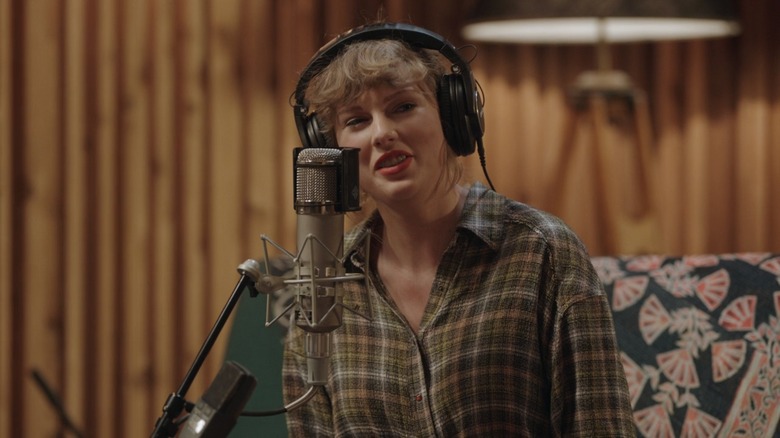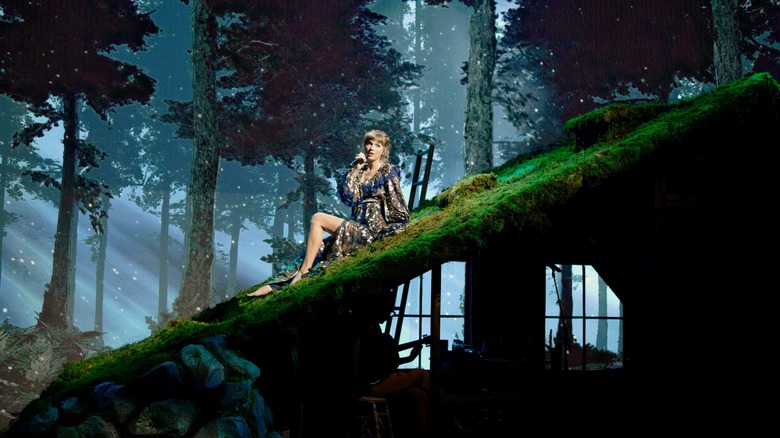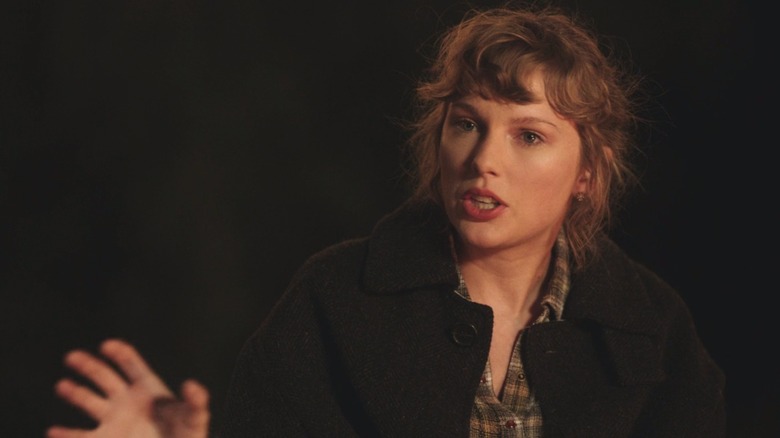The Real Meaning Behind Taylor Swift's August
When Taylor Swift dropped "Folklore" in July 2020, it marked a new and unexpected era for the pop icon. While the sound of the album was significantly new for Swift, taking a more indie and acoustic quality than her previous pop tunes, songs like "cardigan" and "the 1" quickly became some of her most beloved tracks.
"August" is another fan-favorite, featuring the dreamy, wistful quality and lyrical storytelling that "Folklore" is known for. It's the eighth track on the album, aligning with the eighth month of the year, and was produced by Joe Alwyn and Jack Antonoff in addition to Swift. Instead of taking inspiration from the singer's real life, as many of her other works do, this is one of many tracks from the collection that creates meaning through storytelling.
If you're wondering about the real meaning behind Taylor Swift's "august," then it's important to know that the track is one-third of a narrative trilogy featured in "Folklore." Other than that, you need to look no further than the tune's lyrics to get to the heart of it.
August is all about the end of a summer romance
Taylor Swift's "august" is about the end of a summer affair between teenagers, a meaning that is created through the song's poetic storytelling. If the summer element of the narrative wasn't made clear through the song's title, which also doubles as the protagonist's nickname, the summer setting is alluded to through multiple lyrics.
For example, the lines "Salt air, and the rust on your door / I never needed anything more" and "Your back beneath the sun / Wishin' I could write my name on it" hint at this summer setting without being too explicit. While salty, coastal air and sunny days aren't exclusive to the summer, the lines help to create a seasonal feeling within the context of the song. A more overt reference to the summer romance aspect of the song is made through the line, "So much for summer love and saying 'us,'" which simultaneously references the romance's end.
The conclusion of the affair is a central element of the song, as it's the reasoning behind the longing, bittersweet tone of the track. It's most notably referenced in the chorus, such as in the lines "But I can see us lost in the memory / August slipped away into a moment in time." In these lyrics, Swift mentions the passing of August to reiterate the summer setting of the romance and to indicate the conclusion of the affair as it becomes a memory of the past.
The track is one part of Folklore's love triangle trilogy
To understand the meaning of Taylor Swift's "august," it's important to note that the tune is actually one part of a song trilogy about a complicated love triangle among teens. Swift has talked about how she employed literary techniques in "Folklore" to create unique stories through her music, with this trio of songs being a great example of that.
"There's a collection of 3 songs I refer to as 'The Teenage Love Triangle,'" the singer shared in a YouTube Q&A. "These 3 songs explore a love triangle from all 3 people's perspectives at different times in their lives." In addition to "august," "cardigan" and "betty" make up the rest of this trilogy, with each track taking a unique sound and point of view.
"Cardigan" is from the perspective of Betty, who's reflecting on her youth when she was cheated on by her boyfriend James, while "betty" is written from the point of James, who's hoping to win Betty back following his infidelity. "August" is about the girl that James had a summer romance with, who's nicknamed after the title of the track. In this way, the "Folklore" song deals with the concept of wanting to be with someone who's already promised to another.
The Folklore song deals with the idea of being the other woman
"August" is about the end of a teenage summer romance, but this connection is complicated by the fact that the song's subject is already committed to another. In this way, while the track centers around the end of a seasonal fling, it's wistfulness in part stems from the idea of being someone's second choice. Whereas being the "other woman" has a negative connotation, Taylor Swift complicates this idea by demonstrating the genuineness of August's feelings.
This is conveyed in lines such as "August sipped away like a bottle of wine / 'Cause you were never mine," which shows the tenuous connection between James and August by comparing the longevity of their relationship to a wine bottle and referencing his commitment to another. "Back when I was livin' for the hope of it all" is one of the most striking lyrics of "august," as it demonstrates the earnestness of the narrator's feelings while signifying her understanding of the relationship's inevitable end.
Swift comments on these earnest feelings and the idea of being the "other woman" in the documentary "Folklore: The Long Pond Studio Session," saying, "So the idea that there's some, like, some bad, villain girl in any type of situation who, like, takes your man is actually a total myth because that's not usually the case at all. Like, everybody has feelings and wants to be seen and loved, just like Augustine — that's all she wanted was love."



